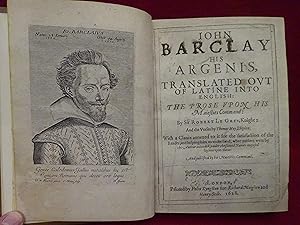A propos de cet article
~FULL TITLE: Iohn Barclay his Argenis, translated out of Latine into English: the prose vpon his Maiesties command: by Sir Robert Le Grys, Knight: and the verses by Thomas May, Esquire. With a clauis annexed to it for the satisfaction of the reader, and helping him to vnderstand, what persons were by the author intended, vnder the fained names imposed by him vpon them: and published by his Maiesties command. ~FULL PAGINATION: (8), 1-256, 247-327, 312-313, 330-339, 324-325, 342-363, 368-369, 366-367, 364-365, 370-489pp. ~Handsome 20th century rebind in full tan calf, blind triple fillets to boards, raised bands and two brown gilt labels to spine. Slight wear to board corners and top edge of spine. All edges yellow. Replacement laid paper endpapers and blank front and rear endpages. Hinges sound. Size:15 x 21cm. Bookplate of Robert Ball to inside front board. A few early pen trials to title page and margins of 3 early pages. A little ink smearing to some letters of 'Barclay' on title page. Inscription in very old hand to blank verso of Epistle Dedicatory: 'Sarah Forrest, left as Memento of Regard by Mr. Hammond'. Some faint scattered marginal crosses. Pencil inscriptions to margins of pp. 47, 211, & 438, partially erased. Minor stain to p. 146. Ink marginal annotation in old hand to p. 325. Small (c. 2cm) tear to base of plate following p. 112. Text complete despite occasionally erratic pagination. Portrait frontis, signed 'D. du Monstier pinxit and C. Mellan, sculp.' 22 plates (inc frontis) by Leonard Gaultier and Claude Mellan, first used in the French edition of 1623. ESTC S100796. All plates have been sensitively and generally almost unnoticeably repaired/reinforced at gutters with laid paper: repairs are most evident to a couple of plates where loss to original margin makes the repair more evident. All plates intact, some slightly age-browned. Similar professional repair to lower outer corner of final page, with no loss to text. John Barclay (1582-1621), writer. Born in France to a Scottish father, Barclay 'seems to have been proud of his Scottish ancestry and to have valued his allegiance to James VI and I' (ODNB): this volume was translated out of its original Latin at James' request. Indeed Barclay lived in England, and sought favour at the Jacobean court, from 1606-1615, when he left for the Papal court, partly in order 'to allow his children to remain Catholic' (ODNB). It was here that he was to write the Argenis, his 'greatest work' (ODNB). Instantly and immensely popular throughout Europe, it is a romance that also functions as an allegory of seventeenth-century Europe, hence the 'clavis', or key to the characters, at the end of this volume. Very scarce thus: the first edition of this translation (the second translation into English), with engravings by two notable French engravers, not always found intact. ~Robust packaging. All UK orders trackable, others on request. Size: c. 500pp. N° de réf. du vendeur DD5136
Contacter le vendeur
Signaler cet article
Détails bibliographiques
Titre : John Barclay, His Argenis. Translated out of...
Éditeur : Felix Kyngston, London
Date d'édition : 1628
Reliure : Hardback
Etat : Near Fine
Edition : 1st edn thus.
Type de livre : Binding tight, text unmarked
![]()




